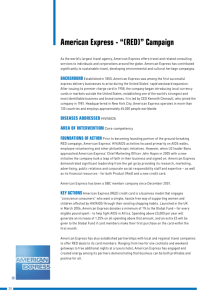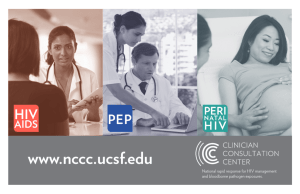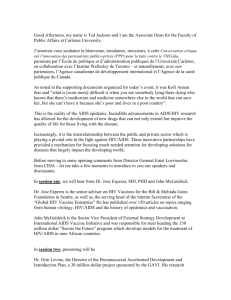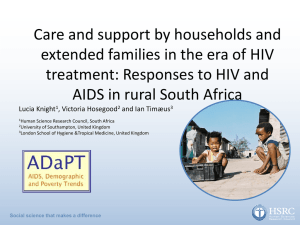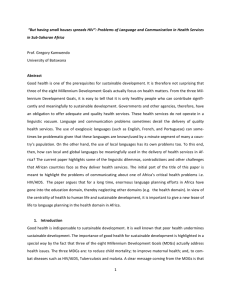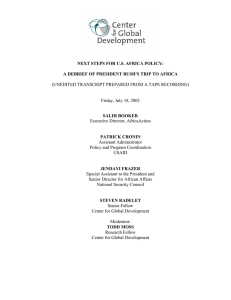File
advertisement
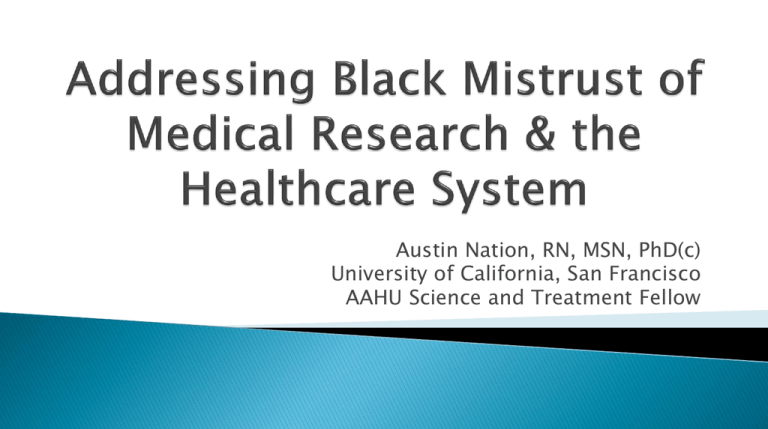
Austin Nation, RN, MSN, PhD(c) University of California, San Francisco AAHU Science and Treatment Fellow What things have you heard? Where do you think this thinking came from? How did it make you feel? How did you respond? Curse by God to eliminate gay people Caused by mosquitoes and/or monkeys “AIDS was created in a lab by the government to kill Black and gay people” (genocide) “The government and pharmaceutical companies have a cure for AIDS but are making too much money to release it” Rich people get different drugs “A lot of information about AIDS is being held back from the public” HIV/AIDS myths in Black communities often stem from the historical injustices and current experiences of Black people African American fear of medical mistreatment dates back to the 1700s History indicates that Black Americans have experienced numerous medical abuses Tuskegee may be the most well known example but it’s not the only one Washington, 2007 Disparities in the health care sector continue to hit the African American community the hardest. Slavery, Segregation, Racism, Poverty Many issues contribute to the disproportionate rates of morbidity (disease) and mortality (death) among Black people ◦ Generations of racism & poverty ◦ More likely to lack access to surgical & emergency medical care ◦ More likely to use hospitals that employ less-experienced staff & less likely to receive high-quality primary care Culp-Ressler, T. (2014) Centers for Disease Control & Prevention (2015) From 1932 to 1972 the United States Public Health Service withheld adequate treatment from a rural poor Black men in Alabama who had syphilis. 1940s validation of penicillin as an effective cure for the disease Tuskegee Syphilis Study has emerged as one of the most prominent examples of medical mistreatment because it reinforced deeply entrenched beliefs within the Black community. Many African Americans agreed that the study represented “nothing less than an official, premeditated policy of genocide” Washington, 2007 J. Marion Sims is honored as the “father of gynecology” (1813-1883) Sims used enslaved African women for his experiments. They did not give consent to his surgeries, and were operated on without anesthesia ◦ Anarcha had >30 operations He also drilled holes into the skulls of Black infants to research trismus (jaw spasm) Washington, 2007 Wall, 2006 Perper & Cina, 2010 1930, 1960, 1970, 1980 (and even today) – Family Planning and Involuntary Sterilization (Negro Project) to lower Black birth rate, reduce welfare burden 1950 – Henrietta Lacks at Johns Hopkins-immortal cells 1960 – Prison and Military abuses (injected with cancer cells to watch disease progression, paralyzed with neuromuscular compound, experimental vaccines) 1970 – Sickle Cell Screening (confusion regarding carriers versus disease) - military considered banning Blacks, Black airline stewardesses fired Some believe that the collective experiences of Black people in the United States have led to a high prevalence of medical mistrust among Black communities. Blacks are 2 -3 times as likely to delay routine check-up as a demonstration of masculinity and caused us to develop different behavior patterns, values, and beliefs Medical mistrust may: ◦ Lead to lower feelings of health care satisfaction ◦ Contribute to skepticism about the efficacy of medications ◦ Lead to critically low participation of Black Americans in clinical trials Washington, 2007 ◦ Inhibit successful and effective and patient-provider Acknowledging & Addressing Mistrust While Engaging Black Communities Trust in health care providers leads to better health outcomes and is associated with: ◦ ◦ ◦ ◦ Increase HIV-related outpatient clinic visits Fewer emergency room visits Increased use of HIV therapy Improved physical and mental health Acknowledge it… they should not be treated as “crazy” or “absurd” Beliefs, misconceptions, and fears of genocide should not be dismissed since they are held by many Black Americans It is understandable, and even expected (especially with older clients), that Black people may be suspicious of official institutions based on their historical Community Empowerment ◦ Recruit and educate Black leaders to acts as community peer educators on suspicion and skepticism ◦ Increase the number of HIV science literate Black community members to serve as popular opinion leaders, health educators, and health professionals ◦ Empower and equip communities to transform their realities, decreasing the perception that other individuals and entities have control over the health and the well-being of Black Americans Acknowledge Doubt/Distrust Without Being Dismissive Acknowledge Origins of Medical Mistrust in Historical Context Talk About Ethical Procedures & Systems of Accountability (informed consent, Data & Safety Monitoring Board) Use Resources to Train & Employ Community Leaders to Teach About Biomedical Research & Interventions Build Trust With Providers & Black Patients (inside & outside of clinical settings) Ask People Why They Feel the Way they do & Ask What Need to Hear/See to Increase Trust in Research & Medical Establishments Meet People Where They Are & Respond With Cultural Competence THANK YOU! Bogart, L. & Thorburn, S. (2005). Are HIV/AIDS conspiracy beliefs a barrier to HIV prevention among African Americans? JAIDS Journal of Acquired Immune Deficiency Syndromes 38.2: Pages 213-218. Centers for Disease Control & Prevention (2015). Black or African American Populations. Retrieved from http://www.cdc.gov/minorityhealth/populations/REMP/black.html Culp-Ressler, T. (2014). Why Racism is a Public Health Issue. Think Progress. Retrieved from http://thinkprogress.org/health/2014/02/03/3239101/racism-public-health-issue/ Gebeloff, Park, Bloch, & Ericson, (2013). Where Poor and Uninsured Americans Live. Retrieved from http://www.nytimes.com/interactive/2013/10/02/us/uninsured-americans-map.html?_r=0 Hoberman, J. (2012). Black and Blue: The Origins & Consequences of Medical Racism. University of California Press Klonoff, E. & Landrine, H. (1999). Do Blacks Believe that HIV/AIDS is a Government Conspiracy Against Them? Preventive Medicine 28.5 (1999): Pages 451-457. Perper, J. & Cina, S. (2010). When Doctors Kill: Who, Why, and How. Page 88.



